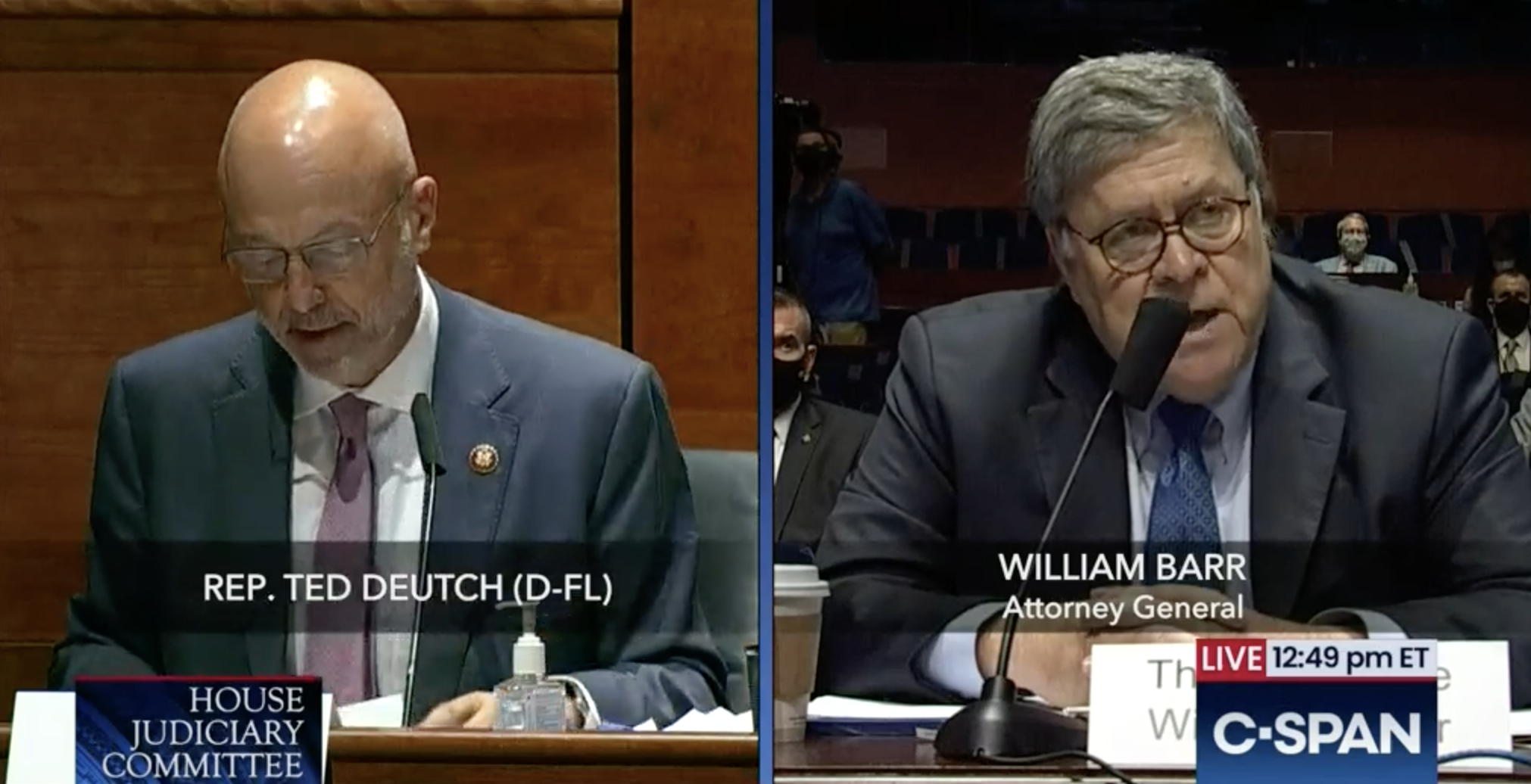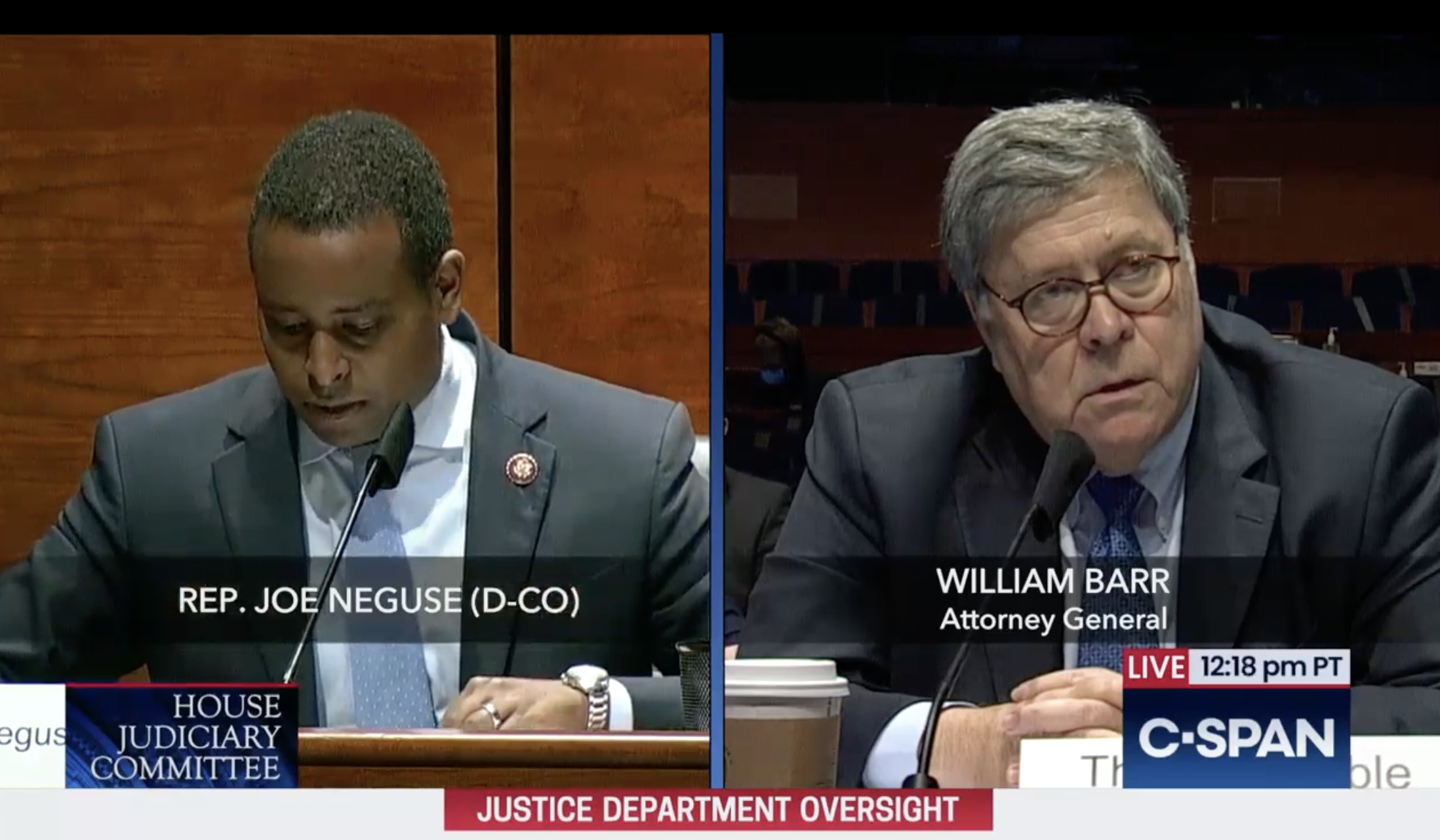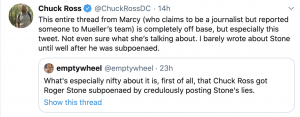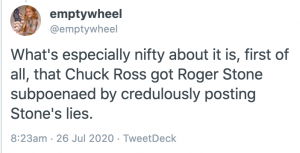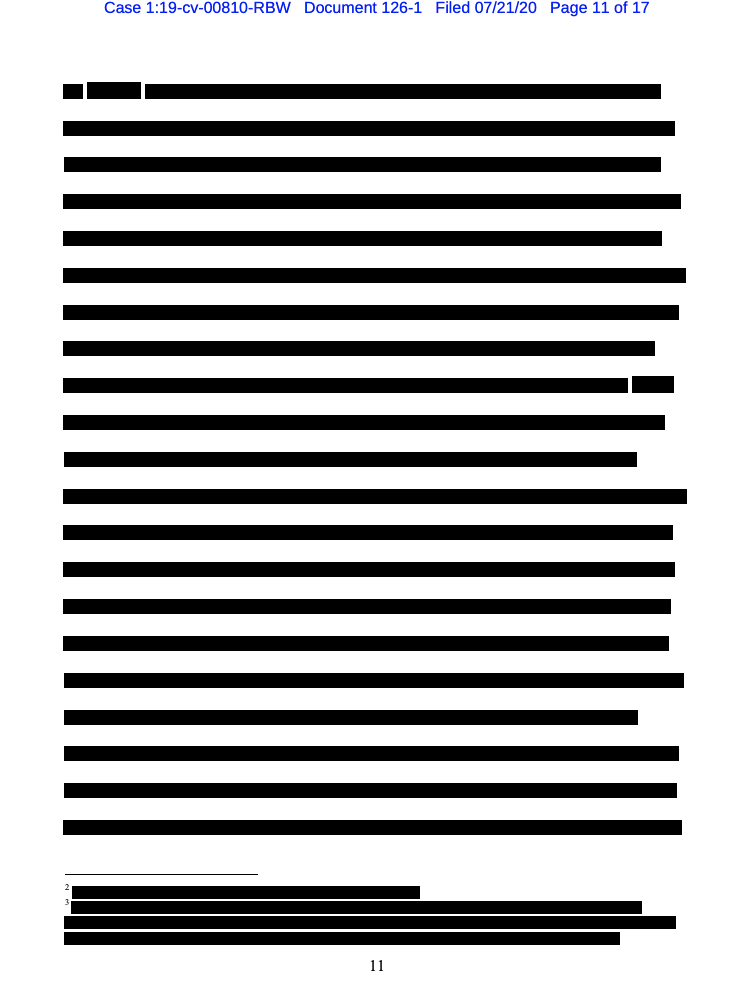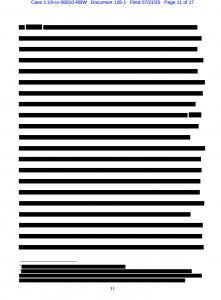I’m just finishing up the Bill Barr testimony before the House Judiciary Committee. While it wasn’t useful at eliciting new information, Barr did not succeed at filibustering over questions he wanted to ignore. Jim Jordan, whose favorite tactic is to scream and refuse to let witnesses answer questions, four times complained that Democrats had insisted on reclaiming their time when Barr tried to filibuster.
Democrats didn’t nail Barr on some of his key lies. For example, as he did in his written testimony, he complained that protestors were endangering federal judges; yet Democrats let him get away with the lie — which he yelled over and over — that Amy Berman Jackson agreed with his view on the Stone sentencing. The reality is ABJ very pointedly disagreed with Barr’s decision that Stone should not be punished for threatening her.
The headline of the hearing, though, should be that, now that he’s finally testifying under oath, Barr backed off his claim — made when releasing the Mueller Report — that the White House fully cooperated with the Mueller investigation. [This is about 45 minutes before the end.]
Joe Neguse: I want to go through a couple of your prior statements. On April 19–or, excuse me, April 18 of 2019, you stated that the White House fully cooperated with the Special Counsel’s investigation. You’re aware of that?
Barr: Umm hmm.
Neguse: Today, yes or no Mr. Barr with the penalty of perjury, do you testify that that statement was true at the time you made it?
Barr: I thought it to be true at the time I made it. Why isn’t it true–
Neguse: I’ll get to that Mr. Barr.
Barr: Does it have to do with quibbling over–
Neguse: Mr. Barr, I’ll get to that, reclaiming my time, you answered the question. I have another question for you. On June 19, of 2020,
Barr: Actually, I have to answer that question.
Neguse: Mr. Barr, you did answer that question.
Barr: No, you said under penalty of perjury. I’m going to answer the damn question.
Neguse: You said the answer was yes. Are you saying no?
Barr: I think what I was referring to — and I’d have to see the context of it — was the supplying of documents.
Neguse: No, Mr. Attorney General, the statement was not limited to the supply of documents. You stated it at a press — Mr. Attorney General —
Barr: I think that’s that I was talking about —
Neguse: Reclaiming my time —
Barr: I think that’s what I was talking about —
Neguse: Reclaiming my time. You stated at a press conference on April 19, 2019 that the White House fully cooperated with the Special Counsel’s investigation. You knew, when you made that statement, that the President had not agreed to be interviewed by the Special Counsel.
Barr: I think that was subsequently —
Neguse: Now on June 18th of this year —
Barr: I was referring to —
Neguse: Mr. Attorney General, I was referring to
Barr: The production of documents —
Neguse: Mr. Attorney General, on June 18th of this year, the Department of Justice issued a statement saying that Mr. Berman, the former US Attorney for the Southern District of New York, had quote, “stepped down.” You’re aware of that statement being released by the department, correct?
Barr: Yes.
Neguse: And do you testify today that that statement was true, at the time the Department issued it?
Barr: Um, he may not have known it, but he was stepping down.
Neguse: He may not have known that he was stepping down? That’s your testimony today?
Barr: He was being removed.
Neguse: Mr. Attorney General. The statement did not say he was being removed. It did not say he was being fired. It said that he was stepping down.
But I think the far more damning testimony from the Attorney General is that he is not familiar with the obstruction part of the Mueller Report.
Eric Swalwell had this exchange with Barr:
Swalwell: Mr. Barr, have you ever intervened other than to help the President’s friend get a reduced prison sentence for any other case where a prosecutor had filed a sentencing recommendation with a court?
Barr: A sentencing recommendation?
Swalwell: Yeah. Have you ever intervened, other than that case with the President’s friend?
Barr: Not that I recall–
Swalwell: Does that seem like something you’d recall? Where you would–
Barr: Well, I’m saying I can’t really remember my first — if you let me finish the question, I can’t remember thirty years ago I was Attorney General.
Swalwell: As Attorney General now?
Barr: Uh, no, I didn’t. But that’s because issues come up to the Attorney General in a dispute and I’ve never [starts yelling] I’VE NEVER HEARD OF A DISPUTE … I’VE NEVER HARD OF A DISPUTE WHERE LINE PROSECUTORS–
Swalwell: Mr. Attorney– Mr. Attorney–
Barr: [still yelling] THREATEN TO QUIT —
Swalwell: Well it’s a pretty big deal–
Barr: Because of a discussion over sentencing–
Swalwell: Mr. Barr, Americans from both parties are concerned that in Donald Trump’s America there are two systems of justice. One for Mr. Trump and his cronies. And another for the rest of us. But that can only happen if you enable it. At your confirmation hearing, you were asked, “Do you believe a President could lawfully issue a pardon in exchange for the recipient’s promise to not incriminate him?
Barr: Not to what?
Swalwell: You said, “That would be a crime.” You were asked, could a President issue a pardon in exchange for the recipient’s promise to not incriminate him, and you responded, “no, that would be a crime.” Is that right?
Barr: Yes, I said that.
Swalwell: You said “a crime.” You didn’t say, “it’d be wrong,” you didn’t say, “it’d be unlawful.” You said, “it’d be a crime.” And when you said that, that a President swapping a pardon to silence a witness would be a crime, you were promising the American people that if you saw that, you would do something about that, is that right?
Barr: That’s right.
Swalwell: Now, Mr. Barr, are you investigating Donald Trump for commuting the prison sentence of his long-time friend and political advisor Roger Stone?
Barr: No.
Swalwell: Why not?
Barr: Why should I?
Swalwell: Well, let’s talk about that. Mr. Stone was convicted by a jury on 7 counts of lying on the Russian investigation. He bragged that he lied to save Trump’s butt. But why would he lie? Your prosecutors, Mr. Barr, told a jury that Stone lied because the truth looked bad for Donald Trump. And what truth is that? Well, Donald Trump denied in written answers to the Russia investigators that he talked to Roger Stone during the time that Roger Stone with in contact with Agents of a Russian influence operation. There’s evidence that Trump and Stone indeed did talk during that time. You would agree that it’s a federal crime to lie under oath, is that right?
Barr: Yes.
Swalwell: It’s a crime for you, it’s a crime for me, and it’s certainly a crime for the President of the United States. Is that right?
Barr: Yes.
Swalwell: So if Donald Trump lied to the Mueller investigators, which you agree would be a crime, then Roger Stone was in a position to expose Donald Trump’s lies. Are you familiar with the December 3rd, 2018 tweet, where Donald Trump said Stone had showed “guts” by not testifying against him?
Barr: No, I’m not familiar with that.
Swalwell: You don’t read the President’s tweets?
Barr: No!
Swalwell: Well, there’s a lot of evidence in the President’s tweets, Mr. Attorney General, I think you should start reading them, because he said Mr. Stone, “showed guts,” but on July 10 of this year, Roger Stone declared to a reporter, “I had 29 or 30 conversations with Trump during the campaign period. Trump knows I was under enormous pressure to turn on him. It would have eased my situation considerably. But I didn’t. The prosecutors wanted me to play Judas, I refused.” Are you familiar with that Stone statement?
Barr: Actually I’m not.
Swalwell: So how can you sit here and tell us, why should I investigate the President of the United States,” if you’re not even aware of the facts concerning the President using the pardon or commutation power to swap the silence of a witness?
Barr: Because we require, you know, a reliable predicate before we open a criminal investigation.
Swalwell: And I just gave you, sir–
Barr: I don’t consider it, I consider it a very Rube, uh, Goldberg theory that you have —
Swalwell: Well it sounds like you’re hearing this theory for the first time.
Barr: And by the way if apply this standard it’d be a lot, it’d be a lot more people under investigation.
Swalwell: Mr. Attorney General, the very same day that Roger Stone said that Donald Trump — no surprise — commuted his
Barr: The two tiered standards of justice were really during the tail end of the Obama Administration.
Barr may well be unfamiliar with Trump’s December 3, 2018 tweet.
Let’s take his testimony as truth.
If that’s true, than Barr is also unfamiliar with the Obstruction portion of the Mueller Report. In passages just recently declassified by Billy Barr’s DOJ, the Mueller Report laid out how the back-and-forth between Stone and Trump might be evidence of obstruction.
As described above, in an interview on November 28, 2018, one week after submitting his written answers, the President criticized “flipping” and said that Stone (along with Manafort and Corsi) was “very brave” in indicating he would not cooperate with prosecutors.897 On December 2, 2018, Stone told the press that there was “no circumstance” under which he would “testify against the president.”898 He also said he had had no discussions about a pardon.899 On December 3, 2018, the President tweeted, “‘I will never testify against Trump.’ This statement was recently made by Roger Stone, essentially stating that he will not be forced by a rogue and out of control prosecutor to make up lies and stories about ‘President Trump.’ Nice to know that some people still have ‘guts!’”900
On January 24, 2019, a grand jury indicted Stone on charges of obstruction, witness tampering, and making false statements.901 One of the counts charged Stone with violating 18 U.S.C. § 1001 for testifying falsely in Congress that he had never told anyone involved in the Trump Campaign about discussions he was having during the campaign with an individual who acted as an intermediary between him and Assange.902 After making an initial court appearance on January 25, 2019, Stone told reporters, “There is no circumstance whatsoever under which I will bear false witness against the president, nor will I make up lies to ease the pressure on myself. . . . I will not testify against the President, because I would have to bear false witness.”903
That evening, Stone appeared on Fox News and indicated he had knowledge of the President’s answers to this Office’s written questions. When asked if he had spoken to the President about the allegation that he had lied to Congress, Stone said, “I have not” and added, “When the President answered the written interrogatories, he correctly and honestly said Roger Stone and I never discussed this and we never did.”904
[snip]
Finally, there is evidence that the President’s actions towards Stone had the potential to affect a decision about cooperating with the government. After Stone publicly announced that he would never provide evidence against the President’s interests, the President called Stone “very brave” and said he had “guts!” for not “testify[ing] against Trump.”
[snip]
With regard to the President’s conduct towards Stone, there is evidence that the President intended to reinforce Stone’s public statements that he would not cooperate with the government when the President likely understood that Stone could potentially provide evidence that would be adverse to the President. By late November 2018, the President had provided written answers to the Special Counsel’s Office in which the President said he did not recall “the specifics of any call [he] had” with Stone during the campaign period and did not recall discussing WikiLeaks with Stone. Witnesses have stated, however, that candidate Trump discussed WikiLeaks with Stone, that Trump knew that Manafort and Gates had asked Stone to find out what other damaging information about Clinton WikiLeaks possessed, and that Stone’s claimed connection to WikiLeaks was common knowledge within the Campaign. It is possible that, by the time the President submitted his written answers two years after the relevant events had occurred, he no longer had clear recollections of his discussions with Stone or his knowledge of Stone’s asserted communications with WikiLeaks. But the President’s conduct could also be viewed as reflecting his awareness that Stone could provide evidence that would run counter to the President’s denials and would link the President to Stone’s efforts to reach out to WikiLeaks. On November 28, 2018, eight days after the President submitted his written answers to the Special Counsel, the President criticized “flipping” and said that Stone was “very brave” for not cooperating with prosecutors. Five days later, on December 3, 2018, the President applauded Stone for having the “guts” not to testify against him. These statements, as well as those complimenting Stone and Manafort while disparaging Michael Cohen once Cohen chose to cooperate, support the inference that the President intended to communicate a message that witnesses could be rewarded for refusing to provide testimony adverse to the President and disparaged if they chose to cooperate.
The December 3, 2018 tweet was a key part of Mueller’s case that Trump’s discussion of pardons for Roger Stone were an effort to get him to be silent about the fact that Trump had lied (not just about talking about WikiLeaks, but also about a pardon for Julian Assange).
This was a key part of the Mueller Report’s analysis of the obstruction case against Trump.
And Billy Barr testified today, under oath, he’s not familiar with it.
It’s not just that Barr disclaims familiarity about Trump’s tweets (though his testimony was inconsistent about whether he saw the one claiming Stone’s sentence was unfair). It seems to be the case that Barr testified that he’s not familiar with the obstruction portion of the Mueller investigation.
And yet, the Attorney General claims to have reviewed that and concluded — for reasons that have nothing to do with DOJ’s policy that a President can’t be indicted — Trump did not commit obstruction.
In other words, the Attorney General’s sworn testimony as of today is that he’s not familiar with the obstruction case against Trump and — arguably — never read it, or at least is unfamiliar with the case it lays out about why, if Trump gave Stone clemency, it would be a crime.




